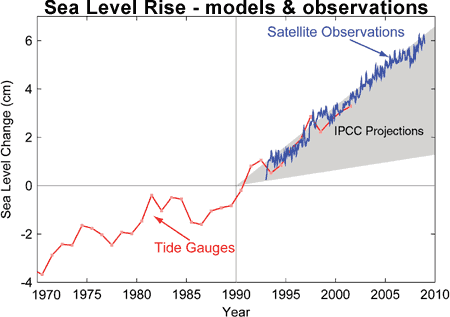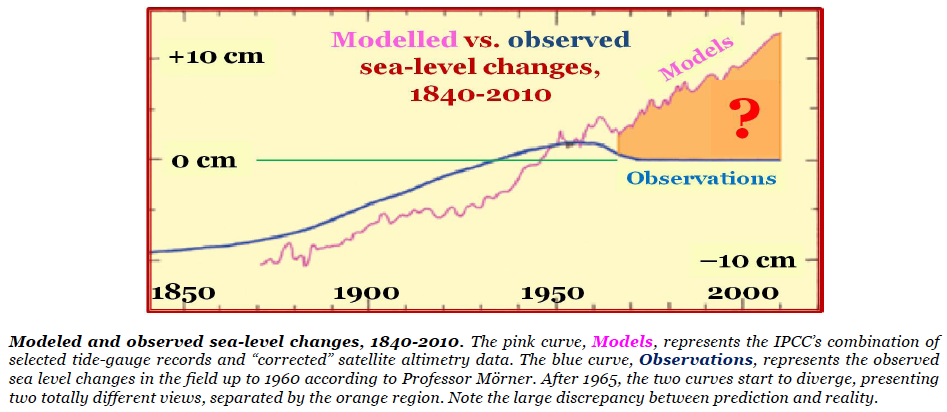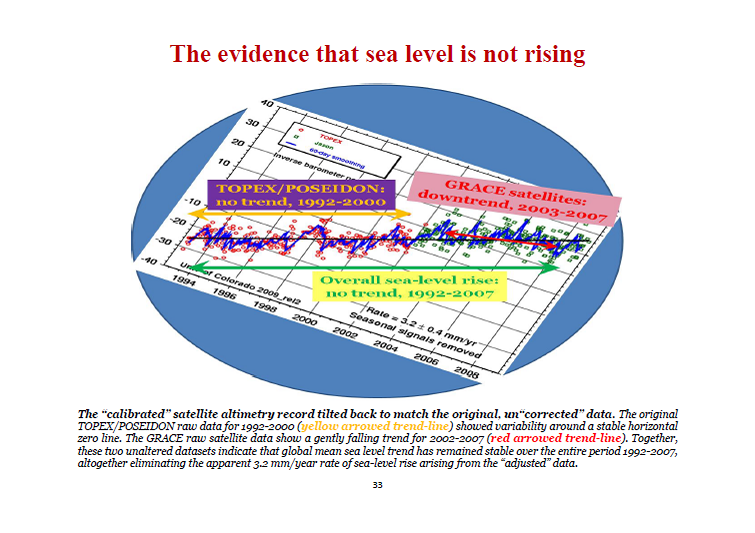Monckton Myth #16: Bizarro World Sea Level
Posted on 14 April 2011 by dana1981
 We have a new entry in the contest for most bizarre "skeptic" argument. The "Science" and Public Policy Institute ("S"PPI) Monthly CO2 Report for January 2011, edited by everyone's favorite "skeptic", Christopher Monckton, contains some astonishing claims pertaining to global sea level rise.
We have a new entry in the contest for most bizarre "skeptic" argument. The "Science" and Public Policy Institute ("S"PPI) Monthly CO2 Report for January 2011, edited by everyone's favorite "skeptic", Christopher Monckton, contains some astonishing claims pertaining to global sea level rise.
First, on page 12, the document claims "Sea level continues to rise more slowly than the UN predicts." This is of course the opposite of reality. Sea level is rising faster than the IPCC predicts (Figure 1).

Figure 1: Sea level change. Tide gauge data are indicated in red and satellite data in blue. The grey band shows the projections of the IPCC Third Assessment report (Allison et al 2009).
On page 29, the "S"PPI document contradicts its previous statement, claiming "Sea level is not rising." This is of course also false. In fact, as we recently discussed sea level is not only rising, but the rise is accelerating. Immediately below this false claim, the document contains the following figure:

How quickly we went from 'rising slower than predicted' to 'not rising' to 'falling'! Notice that the caption claims the blue curve is observational sea level data "up to 1960 according to Professor Morner." Of course, after 1960 (when the "observations" are apparently just made up) is not only when the "observations" supposedly diverge from the models, but also when they diverge from reality! Ah, but it gets even worse from here. On page 33, the document presents what may be my favorite figure of all time:

Monckton and "S"PPI have taken the sea level graph from the University of Colorado at Boulder which shows a 3.2 milimeter per year sea level rise trend (as is still visible in the bottom right of the graph), rotated it to make the trend look flat, and claimed that this is what the "unaltered" and "uncorrected" data looks like.
It boggles the mind that Monckton and the "S"PPI think they can convince people that sea level has dropped since 1950 based on nothing more than their own unsubstantiated claims and blatantly doctored graphs which are completely contradicted by the actual observational data. Monckton has really outdone himself here. How long will it be before these "skeptics" try to convince us that global warming is over because positive temperature trends signify cooling?































 Arguments
Arguments






























[DB] Church and White 2011 make no attempt to project future SLR trends; you'd know this if you'd have read it. A look at their trends:
And the overall trends in global MSL:
The overall trend is greater than linear; in order to hit the expected rise of 0.8 to 1.2 (or more) meters rise by 2100, the trend will also have to continue to increase in greater-than-linear fashion. This will have great implications for various countries around the world, something the "various posters" here have tried to convey. Why? A non-linear increase in trend won't stop on a dime...